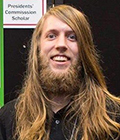
"Isolation, characterization, and biomaterial delivery of lymphatic endothelial progenitor cells to promote lymphangiogenesis"
Host Mentor: Eduardo Silva
Biomedical Engineering Department, University of California, Davis
Lymphatic vascularization is essential for ensuring tissue regeneration and repair due to lymphatic vessels’ crucial role in maintaining normal tissue fluid homeostasis. Localized stimulation of lymphangiogenesis, the formation of new lymphatic vessels, is a promising strategy for addressing a range of disorders and tissue damage via restoration of lymphatic function. Such functions include resolving inflammation, removing waste molecules and cell debris from tissues, and regulation of immune surveillance and trafficking. Cell therapy represents a promising potential avenue for stimulation of lymphangiogenesis. However, current cell based therapies are limited by low survival rates, difficulty in recruitment of cells to damaged tissue, and challenges in incorporating administered cells into new vasculature. Some of these limitations, however, can be circumvented through the use of biomaterial delivery systems. Biomaterials offer advantages such as safe incorporation of administered cells, the ability to localize exogenous cells to a particular tissue of interest, and many controllable variables which can be used to fine tune delivery.
The Silva lab focuses on research surrounding therapeutic vascularization utilizing tissue engineering strategies, biomaterial delivery vehicles, and cell/gene therapy. My work in the lab is centered around utilizing these strategies in the context of the lymphatic vasculature to promote lymphangiogenesis. Specifically, my project aims to isolate lymphatic endothelial progenitor cells (LEPCs) from human umbilical cord blood, characterize the isolated LEPCs, and develop a biomaterial system for their spatiotemporally controlled and targeted delivery utilizing alginate hydrogels.